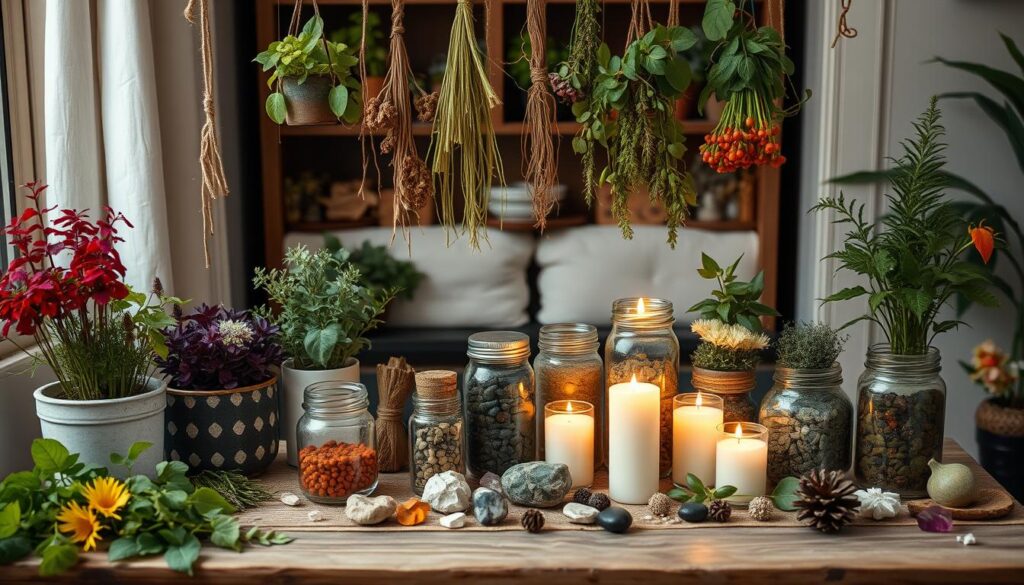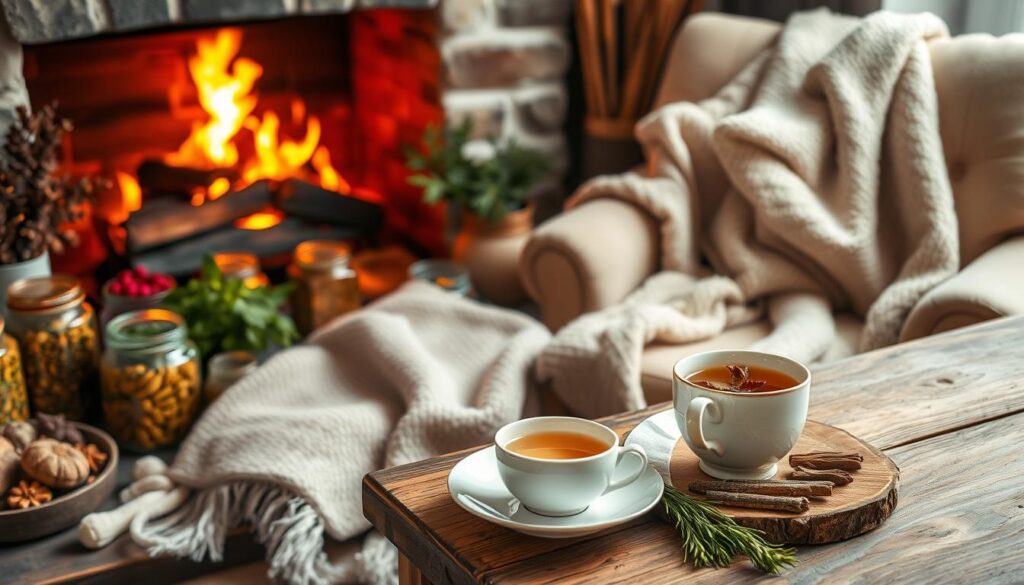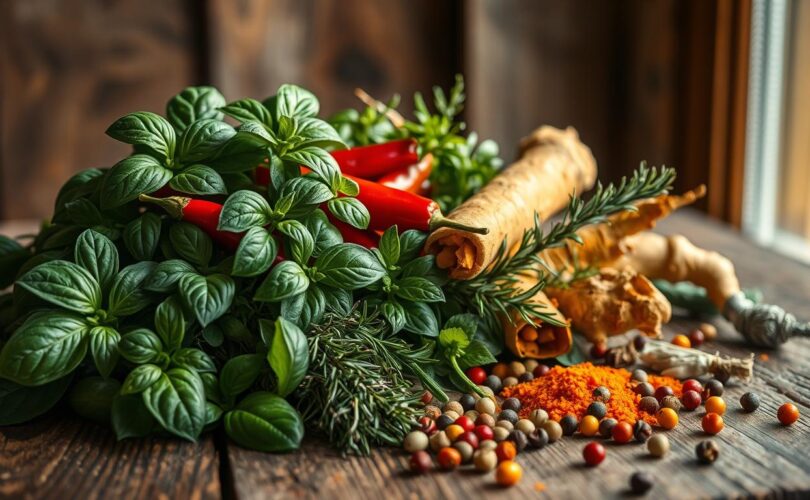As the days get shorter and nights longer, I yearn for a closer bond with nature. Winter can be tough, with cold air and feelings of loneliness. Yet, it’s in these times that I seek comfort in herbs and spices, nourishing my body, mind, and spirit.
In this guide, I invite you to discover the healing powers of these botanical friends. We’ll explore herbal baths, Ayurvedic tonics, and more. Together, we’ll find ways to light up our inner selves and stay strong during the dark season.
Key Takeaways
- Herbs and spices offer natural remedies to support mental, physical, and emotional well-being during the winter months.
- Herbal baths, Ayurvedic tonics, and seasonal rituals can help boost mood, enhance immunity, and promote relaxation.
- Connecting with the rhythms of nature and harnessing the power of plant allies can foster a sense of inner strength and resilience.
- Embracing the wisdom of traditional practices can unlock a deeper understanding of ourselves and our relationship with the natural world.
- Cultivating a mindful, holistic approach to self-care can help us navigate the challenges of the dark season with grace and vitality.
The Power of Herbal Baths
Herbal magic comes from ancient traditions like Wicca. Taking herbal baths is a healing ritual that connects us to nature and our cycles. These baths can cleanse, relax, and renew us, showing the power of plants.
Each moon phase has special energies for herbal blends. At the New Moon, herbs like angelica and lavender help set intentions and cleanse us. For the Full Moon, lavender and peppermint charge our tools and bring us together. As the Dark of the Moon comes, elder and sage help us rest and face our shadows.
In Wiccan herbal magic, earth, air, fire, and water are key. Practitioners choose organic, non-GMO herbs for purity. Harvesting herbs at the Full Moon is believed to make them more powerful.
Herbs like rosemary and ginger are valued for their healing in Wicca. They’re used in teas and salves to enhance their magic. Herbal baths for each moon phase can transform us and support our health.
| Moon Phase | Herbal Bath Blend |
|---|---|
| New Moon | Angelica, Basil, Elder, Lavender, Milky Oat, Peppermint, Sage |
| Full Moon | Lavender, Lemon Balm, Meadowsweet, Milky Oat, Motherwort, Mugwort, Passionflower, Peppermint, Plantain, Sage, Self-Heal |
| Dark of the Moon | Elder, Hawthorn, Lavender, Mugwort, Nettles, Passionflower, Sage, Yarrow |
Herbal baths connect us to nature and ourselves. By honoring the moon and plants, we tap into ancient wisdom and well-being.
Embracing the Moon Cycles
New Moon Herbs
The new moon is a time to start fresh and connect with nature. Herbs like Angelica, Basil, Elder, and Lavender boost our energy and spirit. It’s perfect for starting new health and wellbeing routines with herbs and crystals.
As the moon goes down, we should slow down and think deeply. We can clean, set goals, and welcome change. Our rituals can connect us to the moon’s power, which brings intuition and creativity.
Herbs help clean and attract good vibes during the new moon. Lemon Balm, Holy Basil, and Bay Leaf are great for rituals. Sage, rosemary, and palo santo are for cleaning the space.
The new moon is for making plans and starting projects. Herbs like mugwort and lavender help with this. They match the moon’s vibe of intuition and spiritual connection.
Herbs like Rosemary, Sage, and Lavender are for new starts and goals. Using herbs and crystals can make the new moon’s energy even stronger for healing.
The Full Moon’s Magical Energy
The full moon brings us heightened energy and a deep connection with nature. It’s a time to tap into the moon’s magic and use its transformative powers. By aligning our rituals with the moon’s rhythms, we can grow spiritually and personally.
Working with herbs that match the full moon’s energy is a great way to honor it. Lavender is known for its calming effects. Lemon balm helps us feel refreshed and renewed. Meadowsweet and passionflower help balance our emotions and bring inner peace.
Creating herbal bath blends is a beautiful way to connect with the full moon’s magic. Soaking in these baths can ground us and connect us to nature’s rhythms. It’s a way to understand life’s cycles and our role in them.
The full moon invites us to slow down and reflect on its transformative power. We can do personal rituals, join a community, or simply enjoy the moon’s light. It can spark our inner light and help us grow spiritually.
Resting During the Dark of the Moon
The Dark of the Moon is a time for deep rest and shadow work. Herbs like Elder, Hawthorn, Lavender, and Mugwort support this phase. Herbal baths are a favorite for their simplicity and effectiveness in Moon rituals.
These baths are easy to make and don’t need fancy tools. They help embody slow magick, strengthening the body against daily stress.
Dark Moon Herbs
Herbal baths are a deep-rooted practice, honoring our need for warmth and comfort. The text suggests using Sage as an alternative to Mugwort if it’s hard to find. It highlights the connection between herbs and Moon phases, focusing on New, Full, and Dark Moons for bathing rituals.
The author likes to use specific herbs in different ways, based on their personal connections. They see herbal baths as a chance for ritual and rebirth in water. The New Moon is seen as a time of growth and activity in traditional herbalism.
Working with strong herbs like Mugwort requires respect and mindfulness. This time of the Moon cycle is for resting, reflecting, and connecting with nature’s energies.
Herbs and Spices for the Soul: Potent Remedies for the Dark Season
As the days get shorter, herbs and spices become our natural allies. They nourish our body, mind, and spirit. For centuries, these plant allies have helped us feel better during the cold winter months.
Osha root, known for its benefits to the lungs, is one such remedy. Gotu kola and Ginkgo biloba boost memory and heal the skin. These herbs fight off the blues and the lack of sunlight.
Herbs and spices do even more. Spilanthes boosts our immune system and fights off infections. Paired with Aloe vera, they offer a strong support system for winter.
Research backs up the power of these natural remedies. 17 out of 25 herbs and spices have been studied for their health benefits. This shows the science behind nature’s medicine.
Herbs like oregano, rosemary, and thyme fight inflammation. Spices like cloves, cinnamon, and turmeric are full of antioxidants. These natural solutions help us stay well and happy during winter.
By using ancient herbal wisdom, we can face the dark season with energy. We connect with nature’s rhythms.
Creating a Sacred Space
Making a sacred space, like an altar or a cozy corner, boosts your herbal rituals and self-care. It’s a place to nurture your inner light and connect with nature’s cycles. This space helps deepen your spiritual journey.
Begin by picking meaningful objects, herbs, and natural elements that speak to you. Use a shell or clay bowl for water, herbs and resins for earth, a feather for air, and a flame for fire. Add crystals, candles, or personal items to fill your space with intention and purpose.
Arrange your space for balance and harmony. Use plants and stones that match your Ascendant sign to enhance its energy. Your herbal and crystal friends can help you find peace and grounding.
Use rituals like smudging to clean your space and prepare for herbal practices. Learn from Native American traditions, like the Cree people’s kinnikinnick blend. As you light herbs and pray, let your senses enjoy the transformation.
Creating a sacred space is like building a personal retreat. It’s where you can reconnect with nature and find inner strength. Let it be your sanctuary for herbal rituals, moon ceremonies, and deep self-reflection.

Mindful Living with Herbal Allies
As the colder months arrive, using herbs and spices can help us stay mindful. They connect us to nature’s rhythms. Ayurvedic medicine teaches us to use spices like turmeric, ginger, and cinnamon for health.
Ayurvedic Spices
These herbs have oils that affect our mood and memory. For instance, garden sage is easy to grow or find. It helps digestion and boosts health.
Damiana, from South Texas and Central America, is known for its warmth and mental benefits. It’s often mixed with herbs like milky oats and rose for their effects. European wood betony calms us and aids digestion.
Using these spices can nourish us body, mind, and spirit. They can be part of our cooking, teas, or self-care routines.
“Herbs and spices are not just for cooking – they are powerful allies in our journey towards mindful living and holistic wellbeing.” – [Your Name], Holistic Wellness Advocate
Connecting with Nature’s Wisdom
As winter arrives, reconnecting with nature is key to herbal wisdom and seasonal awareness. Women gathering in communities is a tradition that fosters deep connections. Sadie Pickering uses singing as a healing method, calling it vibration therapy that boosts well-being.
Step outside and notice the natural world’s changes. These changes inspire us, showing growth and rest cycles. All Hallows Eve and Halloween are just a few examples of how cultures celebrate the dark season. Connecting with the land, whether through foraging or simply being outside, offers deep insights and support.
- Learn from the plants and their seasonal adaptations.
- Understand the natural cycles that shape our lives, like moon phases and the sun’s cycle.
- Try contemplative activities like mindful walks or meditation in nature to strengthen your nature connection.
By reconnecting with nature, we tap into herbal wisdom that has helped humans for centuries. Herbal knowledge remains popular, even with modern medicine’s advances. This seasonal awareness helps us live more holistically, balancing our physical and spiritual health.
“The most beautiful thing we can experience is the mysterious. It is the source of all true art and science.” – Albert Einstein
Embracing nature connection opens us to the wisdom of the natural world. Urban farming is growing, with more people having gardens. This journey of seasonal awareness helps us understand ourselves and our role in the world.
Seasonal Self-Care Rituals
As the days get shorter and the air gets crisp, it’s a great time to focus on self-care. This is especially true during the winter season. It’s a time to nourish your mind, body, and spirit. The shift from vata to kapha can be tough, but with the right herbs and practices, we can get through it.
Begin your day by waking up with the sun, as Ayurveda suggests. Enjoy a warm cup of ginger, turmeric, or cinnamon tea to boost your digestion and wakefulness. Choose light, seasonal foods like soups, whole grains, and leafy greens throughout the day. Herbs like parsley, full of vitamin C and minerals, can greatly improve your health.
As night falls, set up a special space for self-care. Light a candle, use incense, and practice gentle breathing or moon gazing. This can calm your mind, reduce anger, and connect you with your inner strength. Adding these seasonal practices to your life can help you find balance and peace during winter.

Winter is a time for quiet, rest, and renewal. Let the cozy, reflective vibe of this season nourish your soul. By following the natural cycles and taking care of yourself, you’ll come out of winter feeling refreshed and ready for spring.
Winter Wellness Tonics
As winter arrives, herbal tonics become key to our wellbeing. They help boost our immune system, lift our mood, and bring balance in the dark months.
Immunity-Boosting Recipes
I love making a tonic with herbs and spices to fight off winter’s cold. I mix 3 cups of conifer needles, 2 cups of rosehips and hawthorn berries, and 3/4 cup of herbs like echinacea and turmeric. Then, I add 1 teaspoon of spices like cardamom and cinnamon to 5 cups of water.
After simmering, I strain the liquid and mix in 1 cup of raw honey and 1/4 cup of brandy. This syrup is great on its own or in hot water for a cozy drink.
It’s smart to make these tonics in bulk and keep the syrup in the fridge for months. This way, you can enjoy them all winter.
Herbs like milky oat and lemon balm are also crucial for our mental health in winter. They help us deal with stress and keep us grounded and clear-minded.
Adding these herbal tonics to our daily lives strengthens our bodies and minds. They help us stay well and resilient all winter.
Cultivating Inner Light
As winter arrives, it can be hard to keep our inner light shining. Yet, this time of year is perfect for growing self-compassion and mindfulness. It’s a chance to connect with our own inner glow.
Herbal allies can help us find our inner light. Milky oats can calm our nerves with a 3-5 mL tincture, taken up to 3 times a day. Rose offers a soothing floral embrace with 1-2 grams in hot water for 10-15 minutes. Lavender tincture, at 1.5-2 mL, 3 times a day, eases anxiety and promotes calm.
Using herbs in a holistic way can be very nourishing. Wood Betony tincture, 2-6 mL, up to 4 times a day, supports emotional balance. Motherwort helps those who bottle up emotions and then burst out.
Embracing the seasons can also guide us to inner light. Herbal consultations often explore our relationship with time. This can lead to advice on rest, less screen time, and mental health support.
Adding herbs like Nettles, Milky Oat, Alfalfa, Turmeric, Chickweed to our daily life nourishes our bodies and minds. Nervines like Lemon Balm, Skullcap, Peppermint, Chamomile, Lavender, and Passionflower support our nervous system.
Connecting with the land and our plant allies through seasonal herbs like Chickweed is key. These herbs can be part of our daily, weekly, and monthly routines. They help us feel grounded and support our well-being.
By embracing winter’s reflective nature and exploring herbal practices, we can grow self-compassion, mindfulness, and inner light. These qualities will guide us through the next season of growth.
As we wrap up our exploration of herbs and spices for the soul, we remember the ancient wisdom and natural remedies that have helped us for centuries. We’ve seen how plants can boost our holistic wellness and help us through the dark winter months.
The herbs and spices we’ve learned about connect us to nature’s rhythms. They offer calm during eclipses and grounding to protect our energy. These plant allies provide many natural remedies for our well-being.
As we enter the new year, let’s keep nurturing our holistic wellness. Let’s embrace the seasons and the wisdom of plants. By caring for our inner light and using herbs and spices for the soul, we can face the dark season with strength, grace, and purpose.

FAQ
What are the benefits of herbal baths?
Herbal baths offer cleansing, relaxation, and a fresh start. They help us connect with nature and our own cycles.
How can I align my self-care rituals with the lunar cycles?
The article shows how to use herbs linked to the New, Full, and Dark Moons. This is through bathing and other practices.
What are some Ayurvedic spices that can support my wellbeing during the winter?
The article talks about using Turmeric, Ginger, and Cinnamon. These spices nourish the body, mind, and spirit in winter.
How can I create a sacred space to enhance my herbal rituals?
The article offers tips on choosing meaningful items and herbs. This creates a space for deep relaxation and meditation.
What are some immunity-boosting herbal remedies I can incorporate this winter?
The article shares recipes with herbs like Elderberry, Echinacea, Turmeric, and Ginger. These strengthen the body and spirit against winter’s challenges.







